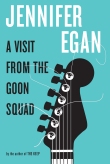Tuesday, April 19, 2011
Musical Fiction Wins Pulitzer Prize
We've long been fans of her novels and short fiction, and are especially pleased to see a true musical fiction take such a prestigious award. Here's her personal website to see what else she's up to.
Wednesday, April 13, 2011
Wonderful Match of Music and Books
But there are many more. There's a whole selection here, and the guy evidently is going to be selling packs of cards of these. Highly recommended.
We at Coral Press love to play around with the imagery for our books, and of course our latest novel, Look at Flower, was inspired by an original Fillmore poster by Bonnie MacLean; and we have an issue of our favorite '60s teen mag devoted to "Flower" up on Flower's site right here. Here's a pic of that:
Wednesday, February 9, 2011

I was reading one of those great Continuum 33 1/3 CD-size books on great LPs, this one on Van Dyke Parks’s Song Cycle, and I was struck by the opening: “Anyone unlucky enough not to have been aged between 14 and 30 during 1966-67 will never know the excitement of those years in popular culture. A sunny optimism permeated everything and possibilities seemed limitless.”
The quote is actually from Ian MacDonald’s extraordinary Beatles book, Revolution in the Head, but when I read it, it made me see why in my own novels I find them often set in years that overlap 1966-67, witness Meet the Annas, Look at Flower, and the forthcoming Surf Music Rules.

Surf Music Rules is the reason I was checking out the Van Dyke Parks book. My novel is an epic tale of the L.A. music scene from th
e surf music days of 1961–2 to 1968, when my hero, Nick Berry, dies on the beach in Mexico from a heroin overdose. The novel’s completed; publication should be announced soon.

In his life, Nick Berry passes through that magical time of ’66–67, and I realized that one of the reasons I write my musical fictions is to capture that magic and make it present and rich for all readers, especially those who weren’t there. I was myself 15 and 16 then, and as I recall, possibilities did seem limitless … as possibilities always should.





